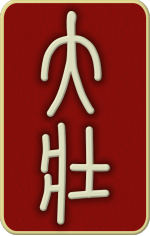
大壮 Dà zhuàng Great power (Powerful) [hexagram 34]


Thunder over Heaven
 Wood element
Wood element
Lunar month: 2 ; Host (controlling) line : 4
The Decision
Great Power – persistence will be worthwhile.
The great become powerful; strength and movement denotes vigor. ‘Great Power – persistence will be worthwhile’ – implies correctness. With great virtue the qualities of everything can be understood.
大壮: 利贞. Dà zhuàng: lì zhēn.
彖传: 大壮, 大者壮也. 刚以动, 故壮. 大壮利贞; 大者正也. 正大而天地之情可见矣! Tuàn zhuàn: Dà zhuàng, dà zhě zhuàng yě. gāng yǐ dòng, gù zhuàng. dà zhuàng lì zhēn; dà zhě zhèng yě. zhèngdà ér tiān dì zhī qíng kě jiàn yǐ!
The Image
Thunder over heaven forms ‘Great Power’. The wise will only follow the honorable path.
象传: 雷在天上, 大壮; 君子以非礼勿履. Xiàng zhuàn: Léi zài tiān shàng, dà zhuàng; jūn zǐ yǐ fēi lǐ wù lǚ.
Line Change 1
Power in the toes. Advance will certainly bring misfortune.
‘Power in the toes’ – this leads to exhaustion.
初九: 壮于趾, 征凶, 有孚. Chū jiǔ: zhuàng yú zhǐ, zhēng xiōng, yǒu fú.
象传: 壮于趾, 其孚穷也. Xiàng zhuàn: Zhuàng yú zhǐ, qí fú qióng yě.
Line Change 2
With perseverance all will be well.
‘With perseverance all will be well’ – taking the middle course.
九二: 贞吉. Jiǔ èr: zhēn jí.
象传: 九二贞吉, 以中也. Xiàng zhuàn: Jiǔ èr zhēn jí, yǐ zhōng yě.
Line Change 3
Common people apply brute force while the wise do not need to do so. Persistence leads to peril. A goat butts the fence entangling its horns.
‘Common people apply brute force’ – but the wise should never act like this.
九三: 小人用壮, 君子用罔, 贞厉. 羝羊触藩, 羸其角. Jiǔ sān: xiǎo rén yòng zhuàng, jūn zǐ yòng wǎng, zhēn lì. Dī yáng chù fān, léi qí jiǎo.
象传: 小人用壮, 君子罔也. Xiàng zhuàn: Xiǎo rén yòng zhuàng, jūn zǐ wǎng yě.
Line Change 4
Remaining steadfast brings good fortune – regrets dissipate. The fence is opened without entangling the horns. The car’s power comes from the wheel axle.
‘The fence is opened without entangling the horns’ – advance can continue.
九四: 贞吉悔亡, 藩决不羸, 壮于大舆之輹. Jiǔ sì: zhēn jí huǐ wáng, fān jué bù léi, zhuàng yú dà yú zhī fù.
象传: 藩决不羸, 尚往也. Xiàng zhuàn: Fān jué bù léi, shàng wǎng yě.
Line Change 5
Easy to lose a goat but there is no regret.
‘Easy to lose a goat’ – the position is inappropriate.
六五: 丧羊于易, 无悔. Liù wǔ: sàng yáng yú yì, wú huǐ.
象传: 丧羊于易, 位不当也. Xiàng zhuàn: Sàng yáng yú yì, wèi bù dàng yě.
Line Change 6
A goat butts the fence, unable to retreat or advance. There is no advantage to this but if ponder upon the situation there will be progress.
‘A goat butts the fence, unable to retreat or advance’ – due to neglect. ‘If ponder upon the situation there will be progress’ – the difficulty will not be prolonged.
上六: 羝羊触藩, 不能退, 不能遂, 无攸利, 艰则吉. Shàng liù: dī yáng chù fān, bù néng tuì, bù néng suì, wú yōu lì, jiān zé jí.
象传: 不能退, 不能遂, 不祥也. 艰则吉, 咎不长也. Xiàng zhuàn: Bù néng tuì, bù néng suì, bù xiáng yě. jiān zé jí, jiù bù cháng yě.
The full set of 64 English translations is available in our new book 'Book of Changes - Deciphered' ➚.